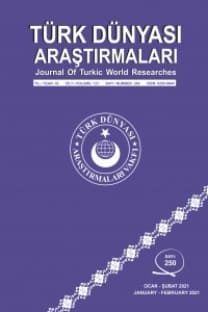Çalışanın işte var olamaması üzerinde öznel iyilik halinin etkisi
İşletmelerde uygulanan verimlilik ölçümlerinde ele alınan işgücü verimliliğini etkileyen işte var olamama problemi çalışanların öznel iyilik hali ile yakından ilişkilidir. Bununla birlikte işin gereği, iş ortamı, kişisel ve çevresel kaynaklı etkiler işte var olamama sorununu tetiklemektedir. İşletmelerde çalışanın işte var olamama problemi tespit edilirken bu problemle çalışanların öznel iyilik hali ve demografik özellikleri etkileşimi kurulmalıdır. Bu sebeple çalışmamızda çalışanlarda işte var olamama probleminin belirlenmesinde; çalışanların öznel iyilik hali ve demografik özelliklerinin belirlenmesi amaçlanmaktadır. Bildirinin ana konusu olan çalışanın işte var olamaması üzerinde öznel iyilik halinin etkisinin belirlenmesi ihracata yönelik üretim yapan ve toplam kalite yönetimi (TKY) sistemi olan bir tekstil işletmesinde çalışanlara uygulanan anket çalışması ile gerçekleştirilmektedir. Araştırmanın analizinde; işte var olamama problemi bağımlı değişken iken, öznel iyilik hali (ruhsal/duygusal iyilik hali, fiziksel iyilik hali ve yaşam doyumu) ve demografik özellikler (yaş, cinsiyet, medeni durum, eğitim düzeyi, işyeri kıdemi, vd.) bağımsız değişken olarak alınmaktadır. Araştırma bulguları çalışanların öznel iyilik hallerini olumsuz etkileyen faktörlerin varlığı onları işte verimsiz çalışmaya sebep olduğunu göstermektedir.
The effect of subjective well being to presenteeism of employees
Applied to the measurement of productivity at work that affect labor productivity in enterprises have dealt with the problem of presenteeism closely related to subjective wellbeing. However, a job requirement, the business environment, triggers the question of personal and environmental origin affect the presenteeism. Businesses have the presenteeism were found to the problem of subjective wellbeing of employees and the demographic characteristics of this problem, the interaction should be established. For this reason, study the problem of workers not being there at work in determining the employee intended to determine the subjective wellbeing and demographic characteristics. The main subject of the paper is presenteeism on the subjective wellbeing of the employee at work determining the effect of export-oriented manufacturing and TQM system applied to a survey carried out by employees of a textile mill. Analysis of the survey, the dependent variable, while the problem of presenteeism, subjective wellbeing (mental / emotional wellbeing, physical wellbeing and life satisfaction, justified), and demographic characteristics (age, gender, marital status, education level, workplace seniority, etc.) Argument is taken as. Research findings in the presence of factors that negatively affect employees subjective states of wellbeing at work them inefficient to work with many patients.
___
- Bass, Catherine E., (2010), The Effect Of Subjective Well-Being On Employee Presenteeism, A Dissertation Submitted to the Faculty of the Graduate School at Middle Tennessee University Doctor Of Philosophy, Murfreesboro, TN, http://www.proquest.com/en-US/catalogs/databases/detail/pqdt.shtml, Son erişim tarihi: 20 Mayıs 2011.
- Biçerli, Kemal, Çalışma Ekonomisi, Beta Basım Yayım Dağıtım, İstanbul 2009.
- Cullen, John - Andrew McLaughlin, (2006), What Drives the Persistence of Presenteeism as Managerial Value in Hotels?: Observations Noted During an Irish Work-life Balance Research Project, Hospitality Management, http://www.elsevier.com/locate/ijhosman, Son erişim tarihi: 27 Temmuz 2011.
- Dew Kevin - Vera Kefe - Keitha Small, (2004), Choosing to Work When Sick: Workplace Presenteeism, Social Science & Medicine, http://www. elsevier.com/locate/soscimed, Son erişim tarihi: 28 Şubat 2011.
- Hansen Claus D. - Johan H. Andersen, (2008), Going Ill To Work - What Personal Circumstances, Attitudes And Work-Related Factors Are Associated With Sickness Presenteeism?, Social Science & Medicine, http://www.elseiver.com/locate/isoscimed, Son erişim tarihi: 28 Şubat 2011.
- Hemp, Paul, (2009), Presenteeism:At Work But Out Of It, Harvard Bussiness Review, http://www.hbr.com, Son erişim tarihi: 10 Mart 2011.
- Kock, C. De, (2007), Gezondheid op het werk: Het fenomen van het presenteisme Gezondheids journaliste op, http://www.e-gezondheid.be/ gezondheid-op-het-werk-het-fenomeen-van-het-presenteisme/actueel/312# Son erişim tarihi: 4 Mart 2011.
- Prokopenko, Joseph, Verimlilik Yönetimi Uygulamalı El Kitabı, Milli Prodüktivite Merkezi Yayınları, Ankara 1995.
- TÜİK; 20062007 İş Kazaları ve İşe Bağlı Sağlık Problemleri Araştırma Sonuçları, http://www.tuik.gov.tr/PreHaberBultenleri.do?id=3916, Son erişim tarihi: 27 Temmuz 2011.
- TÜİK; Hanehalkı İşgücü Araştırması 2008 Eylül Dönemi Sonuçları, http://www.tuik.gov.tr/PreHaberBultenleri.do?id=2077, Son erişim tarihi: 27 Temmuz 2011.
- ISSN: 0255-0644
- Başlangıç: 1979
- Yayıncı: Türk Dünyası Araştırmaları Vakfı
Sayıdaki Diğer Makaleler
Adolf Petroviç Berje ve önemli bir eser akak
Emir Timur'un portresi: Togan'dan günümüze tarihçilerin değişik yorumları
Çalışanın işte var olamaması üzerinde öznel iyilik halinin etkisi
Mehmet Töre YILDIRIM, Tunç DEMİRBİLEK, Deniz TAŞKAN
Xvı. Yüzyılda Pınarhisar kazası ve vakıfları
